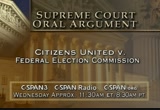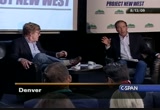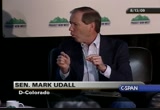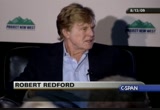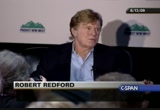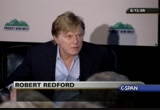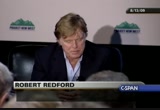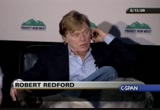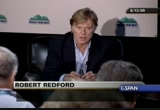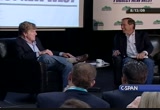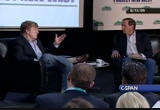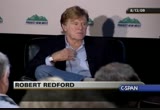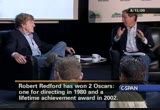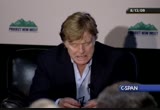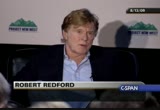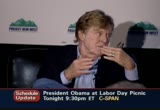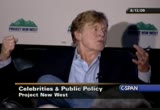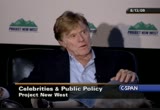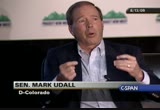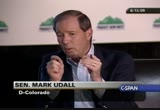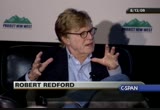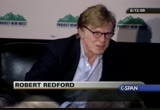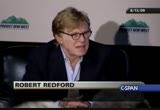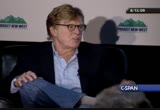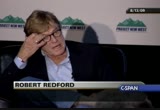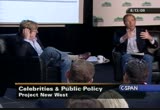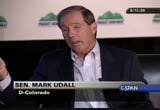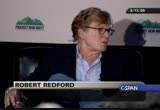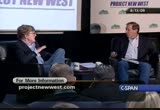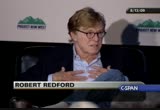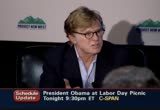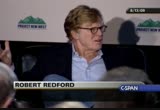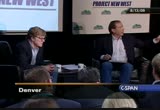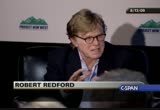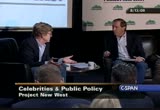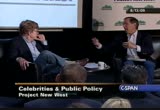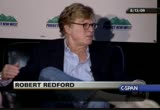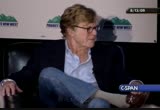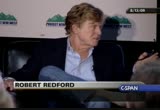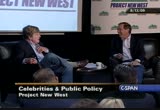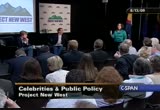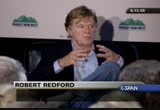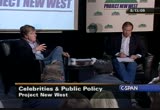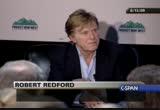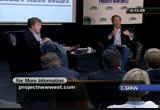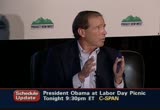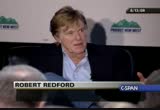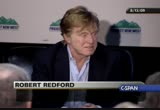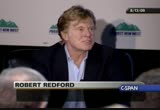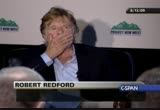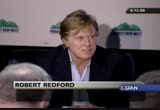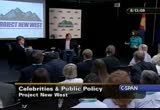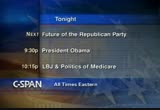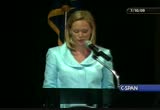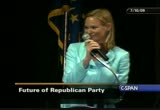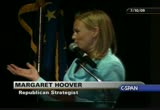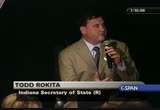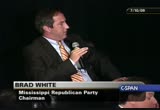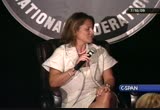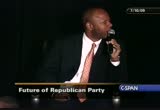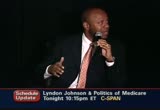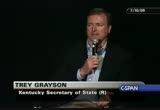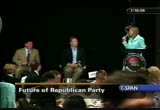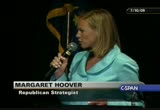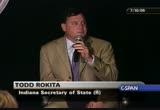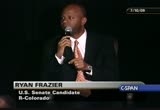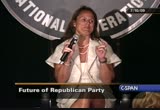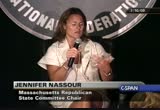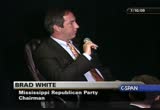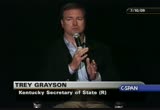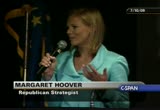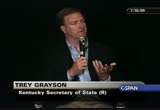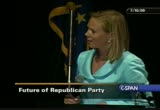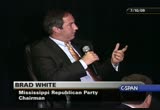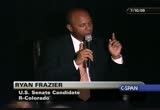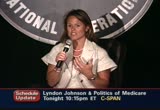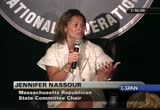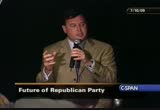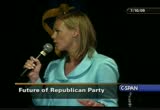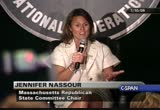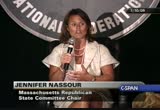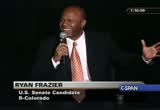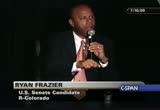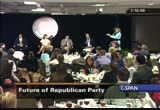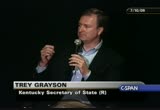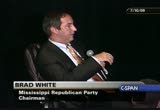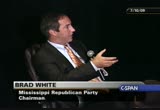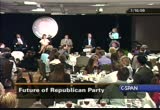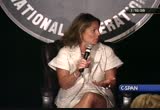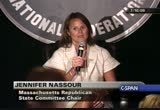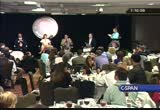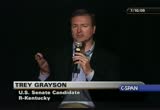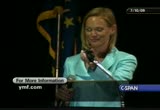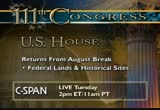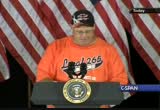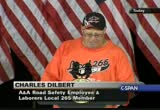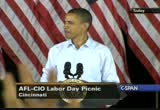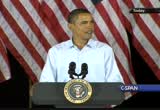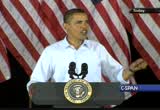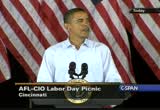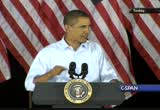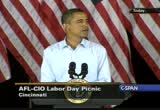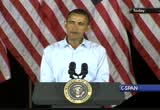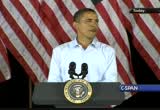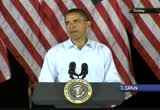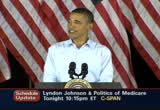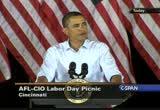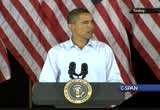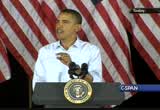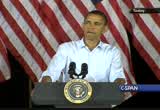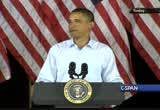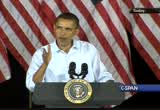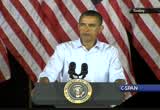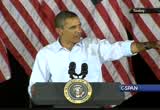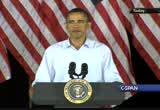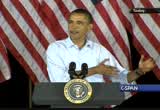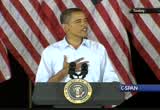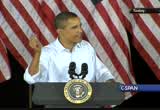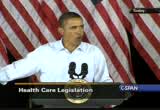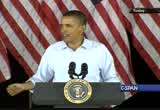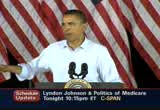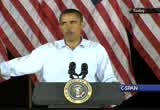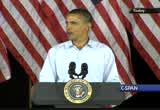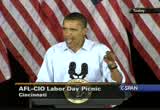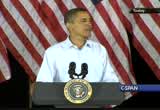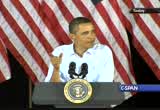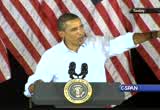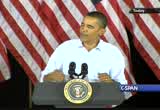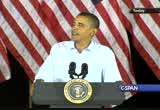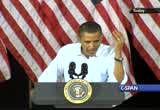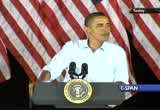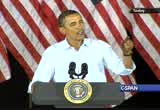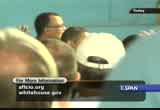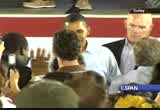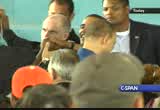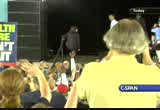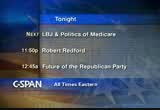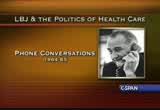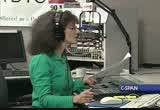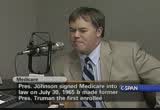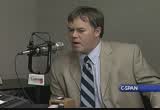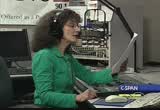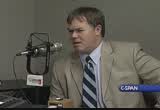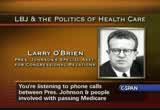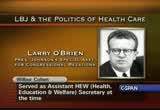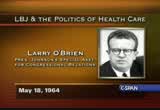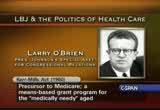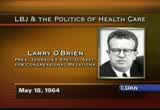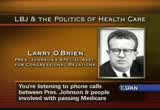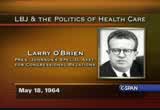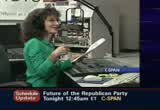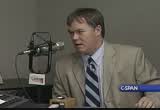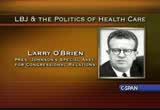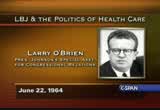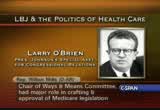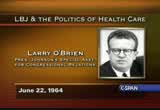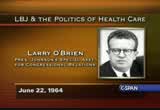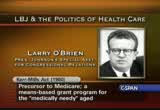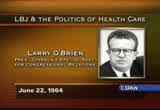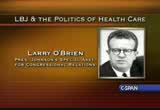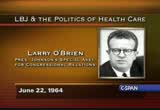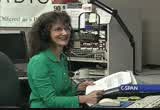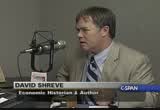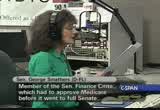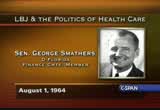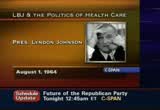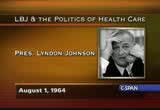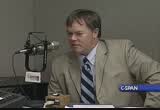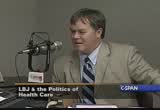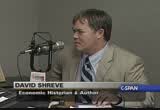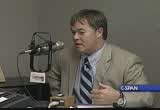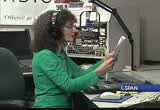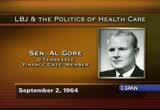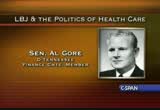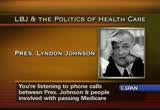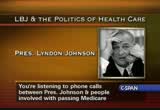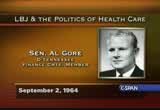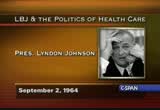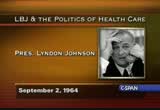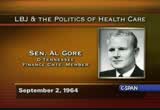tv Tonight From Washington CSPAN September 7, 2009 8:00pm-11:00pm EDT
8:00 pm
8:01 pm
by project new west. this is 50 minutes. >> isn't in great have robert redford back here in colorado? bob, thank you so much for coming and thank you for being a part of the summit. we're going to carry on a little dialogue here for 30-35 minutes and take some of your questions that you are going to pass in. one of the things that i wanted to ask bob about, that i think is fascinating in light of the video, the first thing he told me after looking at the video, he said, the show was over. >> it is a tough act to follow. >> it is a tough act to follow. the idea of some months -- summits and bringing out the very best ideas and trying to move us forward, and you did that a long time ago, a long,
8:02 pm
long time ago. you started doing that in the 1980's, you teamed up with my dad and did one on global warming that we have talked about, where people did not even know what global warming was. but always start jumping and of those, the first thing that i want to ask you is -- a lot of people would say that i was reading some stuff on you, bob, and he is a movie star but he is an anomaly, a man of substance. what is it that brings you to have credentials and a caring for the west? you were born in santa monica california. the west was over here. tell us what brings you to this and what your passion is? >> starting with california, i grew up in a lower working class neighborhood, mostly hispanic. we did not have much access to
8:03 pm
recreation or any of the entertainment that existed other than the ocean. later on i got a job in yosemite national park and i went there to work, i waited on tables and worked at camp curry, and i learn to climb there. i went into the sierras, and then i would go into the desert as soon as i could get a car. i guess the natural environment appealed to mea. and i was not involved politically, i was only 15 when i went to work there, but i fell in love with yosemite. and that led to other developments. my mom was from texas, and in the early war years we would drive to austin, texas to visit my grandfather and we would drive to the indian reservations. and i was only five or six years old, and i was so fascinated with the native american communities in places like
8:04 pm
that, that i would ask my mom, can we stop? i want to get in touch these people. she said, be careful, what you talking about? and i said, look at costumes. they are different. and i made that connection with the native american community then. so by the time was a little kid, there was a connection with hispanics and native americans. so later on, when i went to school in boulder here in colorado until i was asked to leave the -- [laughter] because i was indulging too much in the west. [laughter] >> we will not probe into that. >> it was a great place to be. but i spent a lot of time climbing and to enjoin the west and so forth. boulder, and then running rivers in san juan, the green colorado,
8:05 pm
getting a vote on lake tahoe, all of these things started to multiplied over time. and my affection and interest in the well-being of the west came naturally. and in terms of your family, i think what the video showed pretty well says it. i got involved with small udall -- mo udall on the alaskan situation. i went to raise money for his candidacy in arizona. and your dad and nini got invold when i asked him if he would be the chairman of the institute of resource management. i've gotten clobbered pretty hard -- i got involved in political issues in the west in 1969 and 1970. in those days it was lonely territory because -- in the
8:06 pm
interest of what we preserve for our destiny and what we develop for our destiny, it was one- sided in those years. it was over on the side of development. a voice speaking out about preservation or balance was a small voice, and you were treated pretty roughly by gas and oil interests. and i got some rough treatment. and i -- and when i won against its coal-fired power plant in southeastern utah in 1965, what i found out is that that is pretty incredible country. i spent a lot of time their hiking and motorcycling and riding horses and so forth. i saw this incredible amount of territory and that if they got savaged by oil and gas development, it would destroy something very by a bowl of american identity. so they were not holding any public hearings. it was a consortium of energy
8:07 pm
companies, there was southern cal led, and other companies. they were privately, which means secretly, planning a power plant, 3,000 megawatts. that was at the beginning of 11 total and the west. there was only one in one area. there was one in new mexico. said -- because there were not holding any public hearings, i spent a year with a group doing research and that was pretty awesome. what was going to do to the colorado in the air quality -- and the air quality, and because we could not get any traction, in desperation i went to "60 minutes" and as the producer if they would be interestined in looking at this project.
8:08 pm
if this went through, it would destroy a valuable part of the west that could lead to further destruction. so the guy said, yes, it would do it. and i said, oh, no. i don't think i would be taken seriously because i am an actor. this is before reagan got elected. [laughter] but anyway, we went back and forth and they said we would only do it if you do it. and i said one condition, if you interview the governor of utah and other people to give them equal time. they said, ok. says state -- so they sent an rather out and i said, i don't want to stick in the room and be a talking head. let's go down and i will show you what is at stake. so we went down to lake powell and walk through the territory and i showed them the pictographs, all of these to be destroyed. it was a good interview. and when it came out, it was a very popular show. they got 6000 pieces of mail,
8:09 pm
and they advertise that. one can sit and about seventy- five cents -- one kid said in about seventy-five cents, very sweet, one in to do whatever they can so that they could go and see it. that publicized that and suddenly the group pulled out of the project. and they blame me. [laughter] the next thing i know -- [applause] it's nice now but it was not so hot band. [laughter] there were threatening letters to me and my family. that is when i said, wait a minute. what i do is one thing but i can have what i do fallout unfairly on my kids. they were saying, we will blow you away if you come down into this area. so that led to -- the tag on as, to get back in a minute -- but that led to meet the sighting
8:10 pm
and me being out there alone was a mixed bag. -- but that led to the idea of me being out there alone was a mixed bag. that could be countered pretty strongly on the other side by the media are what have you. i decided to go behind the scenes and create an organization, because i felt that education was the way to go, and training. if he could educate people coming into the field, maybe older people are already lost her whatever, but if you could educate young people coming into positions where management decisions will be made regarding the environment, that might be a good thing. >> tell us how my dad joined up with the you came together, and what you are really focusing their -- on their. and one of the things that is most interesting, you did global warming before anybody really knew what a big powerful issue it was.
8:11 pm
you get the soviet union involved. you had their scientists and our scientists up at sundance. >> the way that that happen, with your dad, i was well away -- well aware of him since he was secretary of the interior. he was involved in the wilderness bill and some pretty major legislation in the 1960's. he was a close friend of one of my heroes. i met wallace dedicating of mountain in yosemite. he and i became very close and i made a small documentary against it -- about his life. stewart and i came together naturally and i asked him if he would be willing to chair this new organization. and he did. but by this time he was retired from public office but he carried so much weight and experience with him, and he has such a wonderful way of
8:12 pm
expressing it, white mo did, that i thought would be wonderful. he also listened to both sides. so he became the chairman and when we put together a group, he said you got have industry and you've got have the environmental group. you got to have the top. so the guy shows up from the industry, the head of southern cal edison, the chief component of that power plant deal. >> he was the guy that wanted to build it and bring the power over, right. >> stewart said, now you've got to work with both sides. anyway, howard comes in there and i am waiting for it. and he says, bob, it is just great to see you. and i said, what, are you kidding? no, i have to tell you, i have to thank you. when that project came up there,
8:13 pm
to tell you frankly, if you saved as a lot because the truth is it was getting so expensive i was looking for a way to pull out and you made it easy. >> you gave as the skis. >> you became the scapegoat and so i wanted to thank you. i thought that was an ironic touch. from that point on, stewart and i got really close. he did it like he did everything. and he was so persuasive because he knew the environmental leaders, obviously, but he also knew industry because he had to work both sides in politics. so for 10 years, we would work on it. we would take top environmental leaders from audubon and informal defense and so on, and then we would take top industry leaders, and we would pick a particular issue and tried have a conflict resolution on the assumption that if you bring two
8:14 pm
sides together, there is something that they can agree on. but you can build from there. if you can build from there using compassion and respect, using an open mind and understanding of the problem from either side, you might get somewhere that we will might get. even though i was probably -- my personal view was more radical by nature but i felt that i did not get anywhere with that, despite being better. so what happened was on the fourth conference that we had, it started out with issues on native american lands, issues of electricity and so forth, and then it went to the denver, the jewish hospital here in denver. we had a conference on western -- one error in the extreme west. the mayor of phoenix was there, he wanted help and so forth. in that conference that we were holding, two guys from a center
8:15 pm
for research came up to make a slide presentation at lunch. it is usually one of those things were seen -- someone comes up and sings to have people happy while they are eating. these guys, the two scientist put up a slight about global warming, and nobody heard about that in 1985. they showed signs of what happened in the year intervals over the last 30 years. and then they showed slides of what was going to happen in 10 and 20 year intervals. and they showed slides of mountaintops with snow white kilimanjaro. you look at it and you cannot grasp it. the ice caps will melt and here is the danger. it will affect climate. when it was over, it was so powerful that it diverted the attention of the conference. later i was in the soviet union on the film -- that window of
8:16 pm
perestroika. the scientists were having a conference and i went there on a conference on global warming and i said, wait a minute, if you were talking about something, we're talking about it, but nobody else is. where i can play a role he is adding you to come to sundance. once i said that, but died there was with me, my associates sundance, with my coat off. what, are you crazy? anyway, a year later they came in we had the conference. stewart ran the conference. he was so good because he was a moderator to balance the conference. almost the entire academy of sciences game. head of the space program, cross
8:17 pm
i got on our side -- carl sagan on our side. we were getting the word out that this was happening in 1989. greenhouse glasnost, it was called. i made the assumption, which was wrong, that it was so verifiable you could not dispute the findings of the two scientific communities of what had been dead most advanced countries of the world. and so i had made the night mistake politically of sending this to bush, senior who was president and gorbachev and that will appreciated and word will get out to the public. that was a mistake. he got shelved, thank you very much, and i will see you. that was the end of that. it was naive of me not to understand the relationship between this and oil and
8:18 pm
gorbachev spoke as. when that went by the wayside, nobody ever heard about it. >> one of the things that my father has told me, and in order to talk with you today, i spent a bit of time with him interviewing him about the irn days. this is one of the remarkable things about bob redford, is that my dad said, the whole time he was doing the summits with you, he said, his approach was not to bring publicity to himself, it was to bring publicity to the issues. and i think you heard that today in terms of what you are talking about. that is why you are here today, because you love the west, you love what it is, you are in sundance and you are a residence of utah and you really love the west. one of the parts of the west that i think is so different, and you know this from your visits to santa fe, is that the
8:19 pm
landscape but it is also the people, the native americans, the hispanics. you have done a wonderful thing with our governor, bill richardson, to expand and native people and hispanics and work with communities. can you talk a little bit about -- people are wondering what happened after irn? you have continued and you will continue at sundance to have a conference center and do things. and i think you are also going to focus on native people and some of their problems and also the rich history that hispanics have with the west. >> yes. that is true, i do of the west. it is instilled. i love is so much -- before the irn, one of the things i forgot to mention was in 1975, i came across an incredible piece of history on the outlaw trail. i came across this almost by
8:20 pm
accident, after "butch cassidy." i spent time with his sister who was still living. one thing led to another and i started connecting some dots, and she said, there -- she showed me letters that he had written and she said, there are some hideout things that are buried away the problem still exist. that led to further research which led to the university of utah historian who knew a lot, which led to this discovery of something called the a lot trail. it was a stretch of trail that winds from montana down to almost mexico. it had three intersecting trails, but oregon trail, the california trail, it was developed by bridge cassidy and had three settlements along the trail. one was hole on the wall, and brown's park, where utah and
8:21 pm
colorado and wyoming are. and that history was so amazing, i said, nobody knows about this. they used to travel at the pony express and it would rob bank and we get to their next tied out. anyway, i found it so fascinating, i went to national geographic in 1975 and said, look, if you guys ought to check this out. this is great history. it was like that of a " 60 minutes" deal, we will do it if you do it. and i said, wait a minute. i bet the national geographic does not like profanity, and i cannot imagine going out on the trails and that not being a big part of it. they said, it is as simple as this, if you will do it, we will do it. if not, we won. i said, let me think about it. and then i thought, what if i pull some people together that did not know which it did that well but were connected by a
8:22 pm
love all -- a love of the west, could ride a horse, and we rode the trail why the outlaws. and i would talk to make the stories. that happened -- and i would document the stories. that happened and we spent about over a month riding of most of the trail, documenting it, and turning it into a book -- an article in the "national geographic." and the book came out of it. in that trip, i think that is where it really hit hard of the real value of the west. what i could see was that agriculture was being threatened by development. and some of the development was necessary. some of it was probably help. a lot of it was not. and the part that was not was replacing something that i thought was, the role of agriculture in the west and a lot to do with our history, ranchers and farmers and agriculture and the land being used in that way. i could see that the red riding
8:23 pm
the outlaw trail. it hit me so hard that that turned me more and more political. which led to the irn and so forth. one no. and, because of my background -- on your thing, because of my background was obviously very attached to that. i started sundance and the flap, and we had a native american lab and a hispanic lab. i wanted to use those labs to create filmmaking capability. in those years, 1980's, there were no native american filmmakers and native americans were simply focused on handcrafts, weaving, and so forth. maybe we will be there to help. and with hispanics, i could see the population increase, particularly in california. and so i wrote a letter to a gabrielle garcia marquez, and he
8:24 pm
thought it would be good to help. those two labs were at sundance. recently, was we worked "smoke signals, through the lab, i saw that it would happen. and then this government -- and this project with government -- with governor richardson came third. that lange goes back to 79, -- that when it goes up through tonight -- that land goes back to 1709. he wanted to put a festival there. i cannot put the festival there but i think we can bring the native american lab here and hispanic part of it because it is more appropriate here. the history is deeper and longer. they were the first americans.
8:25 pm
let's focus on them. so, anyway, so we really have two points of access. >> one of the things, and now like to shift now, we have done a lot of the history, to talk a little bit -- what are the challenges facing the west now? i like to jump into that, because i think we're here about today, what are the challenges and how do we forged a coalition to get things done? i know that you have been involved in all of the western issues come up with our water, climate change, tribal issues -- all of those. my opinion is that we have to do two things on burning coal.
8:26 pm
number one, we better find out in a short period of time with intensive research whether or not we can do it cleanly in any respect. and that should be the federal government investing with energy -- with the industry. if we cannot do it, then we know that we cannot use that. i was like to put a five-year timeline on that kind of a research project. and then we should not build any other conventional coal-fired plants. [applause] and you were there, you were there -- you were there on that power plant leading out on that. and so i am wondering, what you think the biggest challenges that we face? is it a global warming and a coal-fired plants, or is it water, the booming populations? george wilkinson, who teaches here -- >> it is great. >> he is talking about a doubling of population in the generation.
8:27 pm
what is the biggest challenge? what should this group, what should we all gather around and say go and do? >> i think first of all of the above. they are interconnected. on colal, it is a tough shot because kohl has been such a mainstay of the american sustainability for so long. it's pretty hard for someone -- speak to someone who runs a coal company or who are dependent on coal or in industry to support them. ending it that that argument against the future of our planet. that is a very destructive element for the future of our planet. my hunch, and it is just a hunch, i cannot say more than that, i don't think that you can prove they can be claimed. but i think that there are other alternatives to cold. conservation is one of them and
8:28 pm
i think that is happening. in terms of the issues, the connected issues is that for so long the west was seen as this wide open. the rich in resources and never ending, that was there for the taking and meant to produce manifest destiny. manifest destiny worked very well and the early years when railroads were being built, but now manifest destiny has led the west to beat smaller, -- to be smaller, and when you think that the mining law that we're stilling -- live up -- still living with is from 1872. something needs to change. [applause] based on my experience, i think there has to be a realignment of thinking. when you think about water, i remember the days when the
8:29 pm
colorado river made it to the sea. it does not do it anymore. the colorado river as just half of its flow. that is sending something very loud and clear. so water is going to be an issue, based on the clash between development and preservation. and in order to not have that, you have to come up with the alternative. i like to see the return of more agriculture, which sounds like a luddite, but i do not care. i think agriculture is a very respectful and help the use of the land. -- healthy use of the land. but mining and luxury homes, and i think dams should go away. >> we're taking them away, 40 a year. >> the faster, the better.
8:30 pm
time and resources are running out in the west. i see it and i have experienced it. it makes me nervous. you want whenever changes that happened happened. climate changes affecting water , and water is so essential. i see water as a potential thing to be focusing on, that and wildland right now. it is going to be who has an office that understands, who in office that is going to replace those people that we have had a live through -- live with that the past few years they still see manifest destiny and played and they tried to destroy the west. and their administration was an outgrowth of james watt who was there with reagan. you have two administration's committing to developing our resources and thereby destroying our environment.
8:31 pm
they were yesterday's people from yesterday. and there was not anybody forward thinking or where are we going to go? the realignment was amazing for me to watch. the west was a stronghold for the gop. now after the realignment, we have this incredible moment where you have this ticket, you got all of these guys, and now is completely turned around. the same thing happened in the south and the 1960's, but it went the other way. and those are realignments, it tells you something about people waking up and saying hold it. my interest and my investment in this place is being threatened by these people's behavior. i need to get rid of them. that was a pretty positive sign. those are all positive steps that are occurring and i am very much for them.
8:32 pm
these are wonderful states and there is -- here comes somebody. >> she is trying. >> you are interrupting as one of a conversation, but we want to engage your audience here. the oilers we have some utah residents right here. these said the activists who live in utah. >> you know what it is like in utah. >> jill, before we got a question, in utah we had with president bush -- you helped market all and tonya dog elected to congress. i watch what the bush administration was doing. we were battling in the minority in the congress. can you talk a little bit about what the activists and others were doing on the outside to try to -- the bush assault on southern utah? >> utah in many ways is been
8:33 pm
very retarded. [laughter] at least politically on the environment. you've still got the old timers and there, still living in yesterday. then i going to be friendly to the environment. where is the hope? you got sitting right here in the colorado, the secretary of the interior, he sits in a very big comfort see. he has got to do this balancing act. salazar understands the west. i know that. and he has made some very good move so far, but you've also got people on the other side that are still in office that should be probably gone, because of their age in their ideology. they're not aligned with what the west really needs right now. they still see it as a place where you can develop it. you take wild lands, for example, wilderness -- no, that's to be developed, and i disagree.
8:34 pm
with the new voices coming, i think salazar says in a very key position. we will have to see what he does. he is a man they can make a huge difference. but he is going to be hit on the other side by people that are saying, wait a minute, if you are destroying my constituency. there is always someone running furbelows that needs -- running for office that needs votes. one person completely white conservative on the energy bill because he wanted a conservative support. it is not in the best interest of the area of but in self- serving politicians. i am not much for their -- bat. but that is going on and that is the way it is going to be. there is a compromise that is needed. this is a democracy. i just hope that enough people wake up to realize that we are going to lose something incredibly valuable brit what are we going have for our children or their children, a
8:35 pm
photograph or old movies? does that answer your question? >> i think it was trying to focus on new and the rnc -- we were politically in the minority but you did some incredible things with activists on the ground to try to preserve. and in salazar, i think he really did answer my question for you jumped ahead and what you said is that ken salazar undid some of the most destructive policies under the bush administration, this oil and gas leasing, on the edge of national parks and monuments, areas that most of us believe ought to be in those parks and monuments. it was sure fight on the outside, and then finally having the election that i think made a real difference in terms of reversing that policy. >> i an not know about that.
8:36 pm
in fact, i sometimes wonder, all kidding aside, people in my business -- is something that i am sensitive to it -- people in my business, movie actors and celebrities, there is a hidden resentment for you having something to someone else does not have. i am sensitive to that and therefore i am sure there are people that do not agree with what i am thinking. but if you have earned it -- i would not speak out if i did not feel that i had not earned it by being there and spending time there and appreciating at. it was easier -- it is easier now than it was a long time ago. i think utah is changing. years ago, it was a lot rougher than it is now. it is still behind, in my opinion, in terms of what is needed and in particular in
8:37 pm
matters of the west. but he is changing very a lot that has to do with people coming into the state from outside and young people, the new generation seems to be a generation that is really invested in wanting to pay -- play a role in politics and they care about the environment. i am quite helpful for the state of utah and in the west, but only hopeful because only time is going to tell. >> bob, one of my dad's greatest accomplishments -- and he believes this -- was the national park in southern utah. the story about that happened, he was flying as secretary of the interior of her southern utah, and he sees this marvelous landscape. he asked the officials with him, what is that? and they told him, they describe the area. he said, he thought in his mind that he did not want to express
8:38 pm
it because he was with the governor of utah at the time. he said, that is a national park if i ever seen in. and he went back to washington and met with all of his people and work and he got it done. and there are some marvelous things going on. [applause] >> one quick thing. >> go ahead. >> to show you how it utah is changing, they have a terrific governor right now, governor huntsman. he is a republican. to show you when you have borrelia opening mine -- i really open mind and is more mine, when you look at something with the same mind, like looking at the west and natural resources, in huntsman, in the past you have people but saw a utah as a place to be developed. which was ironic, in that utah is a state that would promote
8:39 pm
its historical value. the mormon conquest, the selling of the mormons, and how important a land was in building cabinets and log cabins. at the same time they are opening at all up to this. huntsman comes in and he is of the modern generation of political leaders that understands these values. now he has gone off to china. but on the other hand, that was a sign of utah beginning to understand a new set of values related to the lan. >> jill, do you want to -- i think bob and i would like to hear some of the questions. >> i actually do not because this is so much fun to listen. but i am going to give you a few. but i think all of us were transfixed. people are really enjoying this, don't you agree? [applause]
8:40 pm
so you have both of you in this room the legislative leaders, the first woman leader from you taught ever elected right here, pat jones, your state legislative leaders, if you have acted as coming up organizers coming to of conservationists, you have donors, and these are people who are going back to their community and organizing. i love to hear both of you talk about that. there is a mythology about how the west was won, one of hollywood really captured. one person riding off into the sunset. and we do not see much of the american conversation about how it was communities, wagon trains crossing over, building towns together and building schools. my question is to you, how the west was really bill. how do we translate that in the role of government that is boiling over in this country?
8:41 pm
and how we take the beauty and richness of western history and bring it back to a conservation of the other issues that we're gathering -- grappling with the day? dollars i think first of all, maybe the new west should consider returning to more of the old west in the sense that when agriculture was the main show, you have communities that were built on cooperation. you have neighbors and let families and they lived closely together and work together and they supported each other. now you have subdivisions, cities that are expanding, sprawling, that threatens that epoch. if you could think about less development, development is inevitable. but on the other hand, think about what kind of development.
8:42 pm
it more communities were developed where people work together, because that is the way it was in the west -- it was nothing else to be done. i think that is one thing. the other thing is you want to think -- you cannot just say stop. you have to come up with a solution or an idea for one. obviously, a commitment -- i am an artist essentially, that is my profession. i believe that art has been kicked around for a lot of years, particularly by extremist on the right who have labeled art as a trivial pursuit or elitist or damaging morally, and what have you. it is just a bit. they say, it is not an economic driver. and thus less stimulus bill, when we return to put money aside for endowment for the arts, we were told it was nothing. they tried to cut it down and
8:43 pm
then take it away. the argument that they were using, art is a trivial pursuit and does not make money. i said, hold it. i can tell you from my own personal experience at the sundance film festival in 10 days puts in $92 million into the economy. that is why husband gave us cause to think. -- huntsman davis cost of thing. -- huntsman gave us cost a thing. you can go right down the line. this is a pretty healthy economic driver. maybe if there is more focus on that rather than building a dam -- building are in the community and thing and, of more grass roots, more community building, the anyone have this
8:44 pm
brawl that takes the land away. there might be a chance to save , and the resources in the land, which is water. [applause] >> and to build on what bob said, i think about the big challenges. you look back and bring in up to date. first of all, we are locked in now. we have a strong oil and gas industry but that is not prevented us at all from becoming overly dependent on foreign oil. we're not to the point where almost 70% of our oil comes to six little countries in the middle east and iran and russia. this has put us up against the wall. and so the way to think about that is an american a way to think -- us look at our future
8:45 pm
and what our resources are. i think the resources in the west are abundant in terms of solar and wind and biomass and geothermal. those of the jobs of the future and that is the energy of the future. that is what i hope that all of us will focus on, how do we empower that, how do we move in that direction, and that is where i think we really want to go. you can extrapolate some of the things from the past, but you also have to look at the future. bob, do anything? >> let me tell a good story. my dad worked for chevron. he worked -- he went to work during the war in california. that was the only job he could get at that time. that is how the family survived.
8:46 pm
so i grew up with a father that work for an oil company. i worked there as a kid, earning money in the summer in the oilfields. say you can imagine -- he was transferred when standard of attention for -- standard oil became chevron, he was transferred. his whole life, 38 years in a coal mine. when i became an environmentalist, or began to speak out -- i had been to a congress in vail, and i was sitting in a guest in this conference. they had government people and a lot big experts they're talking about energy. an elected there and i said, wait a minute, it is such a clear picture. you get renewable and non- renewable. all the money, all of the attention, all the political
8:47 pm
weight going into non-renewable energy. renewable energy is over here and nothing has been put there. that is crazy. it seemed simple and crazy to me that this was not getting some attention. how long was going -- how long was the plane going to last? that began his journey for me to focus on that. and it was not easy in the earlier years, but at a certain point, i had to come out against the oil companies. but to delay the power companies and so forth. i loved my dad and he was a good man. he said, what are you doing to me. i said, i'm sorry, dad, i'm sorry. but he was a good enough men to respect my position but it sure made his job crabby at the plant. bridging -- crappy at the plant.
8:48 pm
i was on larry king and he said i could talk about energy. they put me on a remote, i am not in a studio. the sound is awful because they put you in some remote place, you sit on a deck, i live out a napa valley, calif., and so they had a little house and a deck, the camera and a person puts the thing in the year. you're staring at this lens. you can hear in your ear, and he is calling from new york to l.a., and he has a panel of people that are going to be on the show about energy. i do not know what is going on. i don't know what i'm supposed to say. as of the plug into my ear, and
8:49 pm
he said your five minutes out. i said, and i going to talk to somebody? is somebody going to tell me what is going on? he said, yes, larry will be on. i said, when? of iraq and distortion -- [distortion] is this larry? talk about energy. what kind of energy? three minutes. i reckon distortion -- [distortion] this guy comes on o'reilly. i said, what, is this is set up. he said met with bill o'reilly? he said i'm coming right on after you, robert.
8:50 pm
i said, i guess that is going to be interesting. he wanted to tell me what a great guy my dad was. [applause] holiday is something, i came to this company and i started out working underneath your dad. he was so good to me and he was a great guy. and i just wanted to know, when you made that film "but cassidy," your dad came in and you are already talking about stuff, but he came in and said i want to take you all to see this movie my son did. and we went there with your dad, and he introduced us to you, and we became friends of yours. i just wanted to say what a great guy you are. i said, great. then i got on the air, and i said the trouble with the oil -- [laughter] >> that is great. i do not want to stop this but i
8:51 pm
have to. and i want to say something -- i felt for years and i think all of us have you come with such credibility in knowledge about this, we do not hear you as an altar resist as an actor but as a conservationist. -- we do not hear you as an actor but as a conservationist. senator udall, if you are not in politics, you would be a terrific talk-show host. really, it was wonderful. dollars you think i have a second career? i will have to ask bob about that. >> this is been a gift to us. i was thinking so much for being here and spending this time with us. i'm sorry that we have so many questions, but this was too enjoyable just to listen to. i did not want to interrupt.
8:52 pm
thank you so much. [captioning performed by national captioning institute] [captions copyright national cable satellite corp. 2009] >> here is our schedule. next, a group of young republicans talk about the future of their party. later, remarks from president obama on jobs in the economy. a speech to union workers at the afl-cio's labor day picnic. and then a discussion recorded by sea and radio on lyndon johnson in the politics of medicare. -- recorded on c-span radio on lyndon johnson and the politics of medicare. >> president obama will deliver a speech from wakefield high school in arlington, va. on tuesday about the importance of succeeding in school. after the speech, we will open
8:53 pm
our phone lines to take your calls to get your reactions to the speech, including dedicated phone lines for students and teachers. live coverage begins at noon eastern on c-span. >> i'm going to introduce our panel. we have a interesting panel of young republicans. they're going to be -- some of them are elected and some of them are running for elected office. all of them have been elected to represent their state. and so it is really an honor to be here to introduce them. i'll do it one at a time so they can come up and join us. help me welcome kentucky secretary of state trey grayson [applause] next we have your on states -- your states secretary of state t,ood rikeita tood -- todd
8:54 pm
rikeita. we have jennifer nassour. we have ryan frazier. and last but not least that all, mississippi state gop staichair and trailblazer brad white. [applause] i thought what -- it would be appropriate to start off the questions on the tail of bob jones is presentation about technology. understanding that republicans really just did not measure up in the 2008 election. we're not going to do a post- mortem, but we're going to talk about technology and how we can
8:55 pm
use the going forward since we got so ultimately crashed by the democrats and their ability to leverage technology in the last election. i think you're republicans uniformly learn this and are doing interesting things with that already. one of the people doing is todd. we will kick off to you and ask you how you are using technology. how can we fix the technology gap between the republican democratic party? >> i thank you very much. welcome to indiana. i hope you had a great weekend. we work really hard for this and i expected to have a great time. i was start i have it with the panel and try to keep my answer is as short as possible so that we can get to as many questions as we can. from our wonderful moderator and from u.s. law, and a secretary grace and.
8:56 pm
technology gap, i am very proud about 75% of everything that we do our done online. that has allowed me to turn and -- that has allowed me to turn in a budget that was less than the budget that the secretary of state turned in a 1987, when adjusted for inflation. there are some real things the republicans can do when running for office and in office to use technology to drive down the cost. and that is what we're about, right? small government and efficient government. campaign wise, i was not so much impressed that barack obama got millions of dollars from george soros and all those kinds of folks. i was more impressed that he got millions of dollars, $10, $20, up $50 at a time for credit card transactions on the internet. and what i'm going around the state, i am encouraging local parties to absolutely have a
8:57 pm
website, and also had goals. how many new volunteers and e- mail addresses are you going to get to that website this year? how many $50 text are you going to get your county party website? all of that filters down and you have to take better advantage of that. thank you. >> brad, go for it. >> the main thing that we need to do is change our mind set on technology. you were mentioning the credit cards. i was talking with someone that works at the rnc, and a did work for the rnc and worked for the finance department. it was one of the years the barack obama racked up millions of dollars in one month. the you do anywhere close to that in our best month? they said, no, we don't but frankly we would not know how to process all the checks when they came in. they were not even thinking
8:58 pm
about online and using technology to do anything. they were still into the 1970's, frankly. i think the first that that has to be made with the rnc and the state parties is to change our mind set on technology and start realizing that there are valuable resources and tools out there, make sure that we're using each one of them. >> jennifer? >> go ahead. >> for us, i took over as party chair in january, and i was astonished to find out that, this is a small number, 12% registered republicans in massachusetts, under 500,000 people. we had only 4000 e-mail addresses -- horrible. i make my staff, every time we are out, collect e-mail addresses and cellphones numbers, because i was so impressed by the people i knew that were getting text messages from the obama campaign.
8:59 pm
and we got nothing. it was radio silence until the very end of the campaign when we started getting more and more e- mails. but we were so far behind the curve. it is really important for us to do that. >> you had a raise coming up. are you using technology to harness voters and volunteers? >> i'm going to start off by asking you that question. they can tell me for sure. i'm going to get the new wing town for my telephone. -- ringtone for my telephone. the key for having me. i bring you all greetings on behalf of the majestic rocky mountains of colorado. it is good to be out here in indiana. we are embracing technology to help us connect with people. that is ultimately what we're talking about, are we? we're talking about information sharing, to provide information
9:00 pm
about our campaign or access information about our campaign to know what is going on to know what they can do or learn more about our candidacy. we're bringing the new media concepts out there, facebook, we're doing the twitter and all that good stuff, as our former president used to say. we are all about the google. [laughter] but we're looking at ways in which we can continue to provide additional information to people about our candidacy, not just to colorado but around the country. .
9:01 pm
quarks we are going to look at ways to end its that platform as well. >> we have used technology in our office to do more with less. our budget is much more smaller. some of you may have heard that i -- [inaudible] 20% of our contributions came from online. i raised about $6,000 and more came on line. we got $36,000 in the final 36 hours. i am really excited about putting a lot of this into practice. i have already maxed out the number of facebook friends.
9:02 pm
it is at 5000. i cha-cha'ed todd, representative of state. we need more information. [laughter] i know there is an indiana bias against kentucky, but come on. [laughter] >> that was a great round of answers and sort of a softball at first. quickly come up between the two candidates exploring for the u.s. senate, who has more e-mail addresses? how many do you have? >> can i ask cha-cha that question? >> can you categorize how many contacts you have made over the internet? >> we do have facebook. i think i have 1000 or something like that. >> so you have some room to
9:03 pm
grow. >> yes. >> here is a harder question. young republicans are going to be choosing the national chairman for the next year and that thought it would be poignant to ask about conservatism. what does conservatism mean to you? there is a lot of discussion about individual freedom cannot fiscal responsibilities, strong national security, and the word conservatism gets tossed around a lot. i thought it would be nice to hear from each of you walked by the most important tenets of conservatism and how you define conservatism? >> for me, as the practice of conservatism for me individually evolves, it is really focused on the constitution and these days.
9:04 pm
the underlying premise of our constitution is what conservatism is to mate. we are losing that in this country, far and wide. we are forgetting what made this country so great. there are many of us who think the constitution is a living document that changes with the times. it is absolutely opposite. it is an in-place blueprint. for me, conservatism has to get back to those principles. >> i agree. [applause] it means so many things to so many people. it for me, it has always come back to two basic things. freedom and opportunity. freedom and opportunity. somebody once asked me what i
9:05 pm
thought made this country so great. it is the freedoms that we enjoy in the opportunities ahead of us. i think that is precisely what conservatism is seeking to advance. freedom for the individual and the opportunity for everyone to make a life for themselves. why am i the republican? evidently i am not supposed to be one. [laughter] i grew up in the working poor neighborhood in south carolina. my mother separated from my father when i was 7 years old, worked two jobs to provide for three boys. we did not have a lot but we had each other. my mother instilled in us to make a life for ourselves. in order to do that we had to embrace opportunity. when i look at conservatism and what i believe the party's role
9:06 pm
is for young people, it is that role of expanding freedom and opportunity for everyone regardless of age, race, gender. everyone should have an opportunity to make a life for themselves. that is what conservatism is about for me. [applause] >> who wants to take a stab at it next? >> i am from massachusetts. conservatism and massachusetts -- not really synonymous. however, we do have a large constituency that is fiscally conservative. for us up in new england, it is more of a financial question, and endeavor that we are seeking. it is about keeping government small, making sure our taxes do not skyrocket. our legislature just imposed a sales tax increase on us.
9:07 pm
our property taxes are out of control. they want to tax us on gas and raise our tolls. it is a constant surge in government to continue to tax thus -- to tax us who are working very hard. it does not matter if you are working hard as a waitress or in the financial institutions, if you are a professor, it does not matter. for me and for all of us up there, it becomes a question of how do we control costs? how do we make sure that people are not taking advantage of this system? make sure government keeps its dirty hands off of the people. [applause] >> i agree with all what they said. when the national review was started in 1955, and then the
9:08 pm
mission statement yelling stop. that is basically what i think it means. i think transactions should take place in the private sector. if you and i want to make a deal, we can determine one that benefits both of us. any time the government gives entitlements -- any time you give tax dollars, you cannot do that without taking it from someone else. for me, i think it goes back to getting back to the basic fundamentals of government that is of the people and serve the people, and do the things that people cannot do themselves, and only that. >> it is always great going last. what is the next question? i may want to go last next time. i don't have a lot to add to the definition. i guess my one addition i would make is that -- we pretty much
9:09 pm
agreed on things. we answer the question differently. if you had enough time to ask everybody in this audience this particular question, we would generally agree on a 80% of things. i think it is important as we think about the definition and how we apply that to our politics and our policies that we focus on that 80% and not the 20% that divides us. if we focus on that 80%, we will win elections. [applause] >> i could not agree with you more. it was ronald reagan that said eight out of time. if we could agree on those eight out of 10 things, -- i am going to toss to the next question. over the last eight years, i have the honor of working with president bush in the white house. one of the things that got me going allot was bush derangement
9:10 pm
some time. any time anything went wrong, they blamed president bush. there was a trailer out right now. it is an independent movie about food and where it comes from. it is a classic case of bush derangement centum. now that we are in the minority, how do we prevent ourselves from going nuts and having obama derangement send sent thymptom? k even though we are not setting the agenda, health care may not have been at the top of the agenda, nor would some of these spending stimulus packages. is it our responsibility to be putting forth constructive
9:11 pm
opposition agendas and policy ideas in the context of them framing the debate? how do we best do that and be affected in the minority? >> when you are in the opposition, you have to stop at ideas. we ought to do our best to persuade the public that the ideas are bad. one of the ways you can do that is by proposing an alternative that sounds better. the other thing to think about, we are in opposition in washington, d.c., but we are not in opposition all across america. here in indiana, [unintelligible] he is a great governor. [applause] we have some great governors and secretaries of state. we have other great legislators who are doing great things. we need to highlight those.
9:12 pm
a lot of the darkness of the late 1970's, the democrats controlling all of those offices for all of those years, we grew up and had this great farm team of leaders that came from the state level. as we do this, in washington we have to oppose and give great ideas but let's highlight the things going on in the state's. >> brad, do you want to take a stab at it? >> just like the stimulus bill. it was the republican governors who took the first stand against it. i think it is exactly right. it is not enough to be fighting against things. the republican party needs to learn how to be for things and be proactive with issues. it all boils back down to communication. one of the biggest problems with our party, going back to the
9:13 pm
technology and things like that, in the 1990's, when all of these guys got together, the day of effectively communicated to the people that this is who we are, what we stand for. if you elect us, this is what we are going to do. we have gotten away from that. we have failed to communicate effectively. [applause] we have failed in the past at times nationally to put together a very effective and efficient message that can be communicated. then to a great degree, unfortunately, we have lost some credibility in in backing those issues that the republican party has always stood for. until we get pro-active again and back to the basic fundamentals of our party. >> i guess i would add to this, to this question, before we are
9:14 pm
republicans and before we are democrats, we are americans. i think we need to remember that. first and foremost, we are americans. we need to look at it from the standpoint that republicans are not always going to be right and democrats are not always going to be right. as what was said earlier, where they are wrong, they are wrong and we ought to point that out. whatever the issue is, we have to offer a better solution to the challenges that this country faces. when we do so, we regain the confidence of the people in a way that does not make us look petty or divisive what is best to move this country forward. >[applause]
9:15 pm
>> i think it is multi-part. during this time were we are not in power, we should take the time for self reflection to realize and really think about what we did wrong and where we need to go. not what we did wrong during the bush administration about what we did wrong during the election. find it in the field team, get everybody up and running, really of fact the grassroots and talk to people who feel like they have been left out in the cold and no one cares about them. i am sure all of us have been in that position where we've worked hard on the campaign and now the campaign is over and you never hear back from the government official.
9:16 pm
i heard that the republicans just ask for money. what does that do to us? it destroys our reputation and our brand. it takes of reflection to look back and say we are going to stop doing that. we have many smart people in the party. we need to engage them. we need to be spin doctors. the democrats do a great job of spending everything so they look wonderful. we can do the same thing. we can spin the issues said they are our issues governor romney introduced a new health care plan and said it should be a model of what we are doing nationally. instead of looking back on what massachusetts bay, they just forget about what massachusetts did and are basically trying to tax the hell out of all of us. >>[applause]
9:17 pm
>> the only thing i can add to that is what governor romney and what gov. daniels has taught me as a young republican. yes, we have to have the better idea, but that better idea can be less government. that better idea can be a suggestion. we can help ourselves and our neighbors better than any government program can. we have to have the strength and the courage to talk straight to people about that and not look like politicians. i think people can handle it. we ought to talk with them as equals. that is one thing i think we need to do a better job of. >> the next question i have is about a couple of deficit we are running on the republican side. nationally, deficits have tripled. in the republican party, and
9:18 pm
this is not a financial question, there is a diversity deficit, a gender deficit, and an age deficit. that makes you all at a very unique, select group. 41% of our independent, 41% are democrats. what do we do about the deltas here? young republicans are a shrinking species. what do we do about diversity in the republican party? what do we do about the gender gap as well? >> this is one of my hot-button issues. i am a woman. as a woman in my 30's, there are very, very few of me. the mass delegation that is here, we all know it is the
9:19 pm
same women. it is a few women in their 20's, '30's, one or two in their '40's, and then back in the '60s. we as a party have done an awful job in reaching out to the groups of people that would be our normal affinity groups. when i start talking to women and other matteothers about isss that really resonates with parents, making the world better for our kids, it is not a partisan issue. it is amazing how you can start engaging people. it does not have to be a fiscal conversation that you are having. my grandmother emigrated here from sicily when she was 10 in the early 1900's. she taught herself how to read and write in english. she went on to own her own business. she made this world better for
9:20 pm
my mother and better for myself. i would like to leave a better world for my daughters. why can't we reach out to people? there is no reason why we can't grab kids out of college and say whether you are making $20,000 or $200,000, you have to pay taxes. how are you going to support yourself? suddenly, people's interest perks. we have to start reaching out to minority groups on every aspect. i am sorry, gentlemen, but there is one woman and one non-white man. when you look around, there is not much diversity and the party. we have to work on that. we have to talk to everyone and make them talk to their friends and their friends, because we are losing it with young people and women. no interest at all. >> absolutely. [applause]
9:21 pm
gosh, we really do have a lot of work ahead of us. i know we are up to the task. now is the time. for those in the room, now is the time. this is the moment. i like to joke that these are rare moment. barack obama was elected president and the arizona cardinals made it to the super bowl. these are rare times. it is time for young republicans to step forward and engaged. if we engage around those two ideals that said about earlier, freedom and opportunity, we have opportunities to make gains with women, younger folks, minorities, you name it. when it comes down to what people are looking for, they are looking for an opportunity to make a life for themselves.
9:22 pm
that ought to be our focus. we need to be that party that looks at ways how you create economic opportunity through true stimulation, reducing the regulatory burden on our businesses, and allowing them to thrive and create jobs in businesses that put people back to work. that is the republican party and in areas where young republicans can make a difference by engaging how to make opportunities. when people have skin in the game, they care. want a government that is responsible and does the things that it is supposed to do and let them live their lives. look, people want a fiscally responsible government that works for the people, that keeps their taxes low, that builds roads and water systems, that upholds the constitution, and defend our country.
9:23 pm
embraces technology for self- government and gives choice in education, a government that is willing to give people a hand up and not a handout. [applause] >> todd, or trey? >> it is hard to follow those two speakers. i am going to try. one issue that we have talked a little bit about his health care. my wife is the one that is very involved in the health care decisions in our family. as a country, right now, health care is the biggest topic of
9:24 pm
discussion. we know what congress is looking at is terrible. it is putting bureaucrats between you and your health care provider. i don't need to persuade any of you about that. we have the opportunity to refrain the debate and say why don't we empower the consumer, the consumer of that health care, the person that is in the doctor's office? if we can get a better hold of that issue and become more articulate about our vision for the health care future, that may be a way to cut into the gender gap on the issue. it is a particular concern for women. when president bush closed at the gender gap on education, democrats used to kill us on education. president bush convinced a lot of women around the country and men cared about improving the education system. i think health care is the issue
9:25 pm
that we need to grab onto and offer a better way. >> those are great answers. do either of the other two men want to take a stab at the denver city gap? >> -- at the diversity gap? >> i guess the simple answer to it, in my opinion, i have heard speeches about this from republican leaders for about 15 years. it is easy to just go do it. we had a state house district in mississippi. 65% were black voting population. in the past, that would be a district where the state party just concedes to the democrats. we got active, recruited an outstanding candidate, a true
9:26 pm
believer. we ended up losing that race but for the first time in the history of that district, the democratic party, everyone had to go over there and fight it. there was another district, the same way, where we recorded the only sitting republican woman senator. i think it is something that you just have to go do. somebody and called me when i was that young. you have to reach out and go do it. >> don't be afraid to engage. i don't care who they are, where they come from. don't be afraid to engage. just talk to them. we have more in common than apart. >> i think the man from colorado is exactly right. we have to be careful with pandering. i don't think anybody wants to do that. because of who we are, personal responsibility activists,
9:27 pm
limited government activists, we are selling health food. they are selling twinkies, a much easier sale, but it will kill you. whatever the demographic is, we have to make an argument that selling health food is stronger and better. we can't wait for them to come to us. we have to go to them for that message. >> we have one more question to wrap this up. i would like to ask each of you to offer what you see as the biggest challenge in the next two to four years and how we should address it. i did not give them a heads up that i was going to ask this. >> i think connecting back to the american people, what we have been talking about the whole time. as jennifer said, doing a self evaluation, determining who we are, and then communicating that effectively to the american people.
9:28 pm
fighting that fight and reaching out and being something that people would want to be a part of and that people can buy into and get skin in the game with. i think that is what we need to be about. >> i will go. it absolutely is -- i think our biggest challenge is just branding. we are the labeled that the republican party has gotten is awful. we are these mean, cold, nasty people that do not small and that -- and do not like to have fun or party. i know you guys had a party last night. so, need to go out there. our principles are so phenomenal. we want smaller government, limited taxes, personal responsibility, liberties, and
9:29 pm
freedom. who cannot agree with that? if we are not communicating those during a normal discussion, people will not listen. we have to engage people and make them feel good and make them believe in us. we can't sell them a bill of goods and not follow through on it. it is very important for us to forge ahead, talk to everyone, do our reach, make people invested in the party and invest in their future. that will get us back on the right track. >> i kind of skipped my turn. i talk a little bit about this on my website. www.frzierforcolorado.com. we have to connect with the people. we have to connect with the people on the issues that they care about. if we do that, i think we will regain confidence and restore ourselves as the majority of this country. [laughter]
9:30 pm
>> i will quickly get out of the way by saying thank you for coming. there is another fellow in the room who is thinking about running for the u.s. senate against a certain mr. by. thank you for being here as well, sir. [applause] as i turned it over to secretary grayson, if you go to each of our website, you will see on our biographies a very important fact. we have kept the wars between indiana and kentucky down to zero during our tenure. thank you very much for coming. [applause] >> as we are looking over the next couple of years, a lot of the conversations have given us some food for thought.
9:31 pm
to me, when you are in opposition and try to stop bad ideas, always remember to be forward-looking. i think ronald reagan paused genius was -- i think ronald reagan's genius was forward- looking. it was the dawn of a new day. be optimistic and be positive. president obama was able to do that during last year's election and it really helped him out. as we think about the future, look at the policies. when i look at these, i want to leave a better life for my daughter's then my parents left for me. keep looking to the future and keep looking forward. that optimism is the tie that binds all americans. if we could recapture that, i think we can recapture a lot of
9:32 pm
the office is that we have lost over the years. [applause] >> thank you. thank you to our speakers and sharing your thoughts with us. we would also like to thank the chair of the convention that put this on. he did a terrific job. [applause] have a wonderful rest of your convention and thank you for being with us here today at lunch. [applause] [captioning performed by national captioning institute] [captions copyright national cable satellite corp. 2009] >> still to come, remarks from president obama on jobs and the economy during a speech to a
9:33 pm
union workers. after that, a discussion recorded by c-span radio on lyndon johnson and the politics of medicare. later, robert redford on how he got involved on politics and environmental policy. >> the house returns tuesday at 2:00 p.m. eastern from its august break. members will begin with bills involving federal lands and historical sites. live coverage of the house on c- span. the senate also returns on tuesday at 2:00 p.m. eastern. senators will begin with general speeders and later in the day, for is it -- foreign tourism in the u.s. live coverage of the senate on c-span2.
9:34 pm
>> president obama visited cincinnati to talk about jobs and the u.s. economy during a speech to union workers at the annual labor day picnic. he also addressed health care legislation and the expected debate this fall. his remarks are 40 minutes. >> let's get fired up for this. [cheers and applause] i am going to bring him out in a minute. hello, brothers and sisters. i am a member of [unintelligible] [applause] i was asked to introduce the president because i am living proof that his stimulus package he connected is working. i was working for new employment and my insurance started to run out. i had to make payments but they were partially covered by the
9:35 pm
stimulus package, saving me and my family money when it counted the most. the stimulus package provided extra money for my family and i from going further in debt. when i started back to work, the company that i work for was awarded work putting up signs and doing other road construction work on highways and state routes. these projects are being directly funded by the stimulus package. i would also like to say that i am a parent of a special needs child. without further ado, -- [cheers and applause] without further ado, it is a privilege and an honor to me to bring our president barack obama
9:36 pm
out here. let's have a big round of applause for him. [cheers and applause] >> hello, cincinnati. thank you. [applause] thank you, ohio. thank you, labor. [applause] it is good to be back in cincinnati. [applause] it is good to be back in ohio. it is good to be back among great friends, great leaders, and that want everybody to give
9:37 pm
a big round of applause to charlie billboard for that great introduction. -- charlie dilbert for the great introduction. give cathy a big round of applause. [applause] how are you all feeling today? are you fired up? are you ready to go? i can't think of a better place to be on labor day than an america's biggest labor day picnic. and with the workers and families of the cincinnati afl- cio. [applause] i am so proud to be on the stage with charlie because he reminds us that in these tough times, america's working men and women are ready to roll up
9:38 pm
their sleeves and go back to work. i want to salute your local afl-cio local leaders. your executive treasury secretary, your president, the state president, and your outstanding national leaders, the man who we think for devoting his life to working americans, president john sweeney. he is right there. and the man who will pick up the baton of leadership we need to succeed because a strong labor movement is a part of a strong economy, secretary- treasurer rich trumpka. [applause]
9:39 pm
although, ohio is wonderful -- we have the lieutenant governor in the house. secretary of state jennifer bruner, the attorney general, the cincinnati mayor, hamilton county commissioner, commission president david pepper, we are joined by members of all high as outstanding congressional delegation. [applause] and a great friend who is at the forefront of every fight for a high as working men and women senator sharon brown. [applause] i am also proud to be here with
9:40 pm
a leader who is reenergize and the department of labor, who realizes it is not the department of management but the department of labour. a daughter of union members, a daughter of a teamster, the secretary. [applause] my director of the recovery for all those communities and workers who does outstanding work. now, cincinnati, like a lot of americans, you are having some fun today, taking the day off, spending time with the kids. some of you may be proud of your grilling skills. [laughter] every man thinks he can grill. whether he can or not. that is what michelle says.
9:41 pm
michelle says she is a better griller than me. i don't know. [laughter] you are enjoying some good music, some good food, some famous cincinnati chili. but today, we also pause. we pause to remember and reflect and to reaffirm. we remember that the rights and benefits we enjoy today were not simply handed it to america's working men and women. they had to be won and fought for by men and women of courage and conviction from the factory floors of the industrial revolution, they stood up and they spoke out for an honest day's work.
9:42 pm
[cheers and applause] many risked their lives, some gave their lives, some made it a cause of their lives, like senator ted kennedy who we remember today. [applause] let us never forget, much of what we take for granted, 40- hour work week, the minimum wage, health insurance, paid leave, pensions, medicare, social security, they all bear the union label. [applause] it was the american worker, men
9:43 pm
and women just like you, who returned from world war two to make our economy the envy of the world, whose labor helped build the largest middle-class in history. even if you are not a union member, every american owes something to america's labor movement. [applause] as we remember this history, let us reflect on its meaning in our own time. like so many americans, you work hard and meet your responsibilities. you play by the rules and you pay your bills. in recent years, the american dream seems like it has been slipping away. from washington to wall street, too often, a different attitude prevails. wolf was valued over work. greed over responsibility.
9:44 pm
the right to organize was undermined rather than strengthened. that is what we saw. it may have worked out well for those folks at the top, but it did not work out for you and it did not work out well for our country. that culture and the policies that flowed from it undermine the middle-class and help create the greatest economic crisis of our time. today on this labor day, we reaffirm our commitment to rebuild, to live up to the legacy, to combine the enduring values that have served us so well for so long, hard work, responsibility, with new ideas for a new century, to ensure that our great middle class remains the backbone of our economy, not just a vanishing ideal we celebrate at picnics
9:45 pm
every year. we want a reality for the families of ohio and the families of america. cheers [and applause -- [cheers and applause] that is what we have been working to do ever since i have taken office. some people have already cut -- have already forgotten how bad it was seven months ago. they have a selective amnesia. let's just remind them for a second. [cheers and applause] a financial system on the verge of collapse, about 700,000 workers losing their jobs each month. the worst recession of our
9:46 pm
lifetimes threatening to become another great depression. that is what was happening seven months ago. that is why we took bold, swift action. that is why we passed an unprecedented recovery act and we did it without the usual earmarks and pork barrel spending. ohio, it is working. [cheers and applause] times are still tough, i know that, but we have given 95% of america's working families a tax cut. 4.5 million families in ohio including here in cincinnati, a promise we made during the campaign and one that i kept as president of the united states. [applause]
9:47 pm
we cut taxes for small businesses, made new loans to more than 1000 small businesses in ohio said they could grow and hire more workers. we extended unemployment benefits for 12 million americans including charlie and nearly 570,000 ohio citizens. [applause] across america, we have saved the jobs of tens of thousands of state and local workers, including teachers and first responders right here in ohio. don't tell -- don't take my word for it. ask people here in ohio. we are rebuilding america's infrastructure, including improvements to interstate 75 in hamilton county led by a local cincinnati contractor. [applause]
9:48 pm
we have got more than 200 other highway projects across ohio and we are making an historic commitment to innovation. doubling our capacity to generate renewable energy, building a new smart grid to carry electricity from coast to coast, laying down high speed rail lines, providing the largest boost in basic research in our history, all of which will put people back to work. steel workers, plumbers, pipefitters, engineers, you name it. so our recovery plan is working. bricklayers, too.' [cheers and applause] the financial system has been
9:49 pm
saved from collapse. home sales are up. we are seeing signs of life in the auto industry. business investment is starting to stabilize. for the first time in 18 months, we are seeing growth in manufacturing. when was the last time you heard that here in the united states of america? [applause] on friday, we learn that the economy lost another 260,000 jobs in august. whenever americans are losing jobs, that is simply unacceptable. for the second straight month, we lost fewer jobs than a month before, and it was the fewest jobs we had lost in a year. make no mistake, we are moving in the right direction.
9:50 pm
we are on the road to recovery, ohio. bill let anybody tell you otherwise. [applause] -- don't let anybody tell you otherwise. yes, we will. -- [chanting] >> but, my friends, we have a long way to go. we are not going to rest. not until workers looking for jobs can find them. not until responsibility -- not until responsible mortgage owners can stay in their homes. not until we have a full economic recovery. [applause] week -- we can't do that if we go back to that old economy.
9:51 pm
overleveraged banks, inflated profits, maxed out credit cards, ceo's and bankers getting multimillion-dollar bonuses, and economy of bubbles and bursts, your wages stagnant while corporate profits soar. even if we recover from the recession and work to cut the deficit, we have to build a new foundation for prosperity. we need a reformed financial system. we have to have regulations in place that protect consumers so we never have a crisis like this again. i don't 1 to have to bail out any more banks. we have to make sure we have regulations in place to prevent them.
9:52 pm
[applause] an america where energy perform creates green jobs that can never be outsourced. and america at that commits to education because the country's that out-educate today will get the best jobs for tomorrow. we have to do a better job of educating our sons and our daughters. yes, i am going to have something to say tomorrow to our children, telling them to stay in school and to work hard. because that is the right message to send. [cheers and applause]
9:53 pm
we need an america that once again it invests in the middle class, which is why i have created a task force for middle-class working families led by my outstanding vice- president joe biden to make sure our policies always benefit you, the american worker. [applause] today, we are taking another step. i am naming ron bloom to lead our efforts to revitalize the sector that helped build the middle class, american manufacturing. ron has worked with steel workers, service employees, and management to create jobs. he helped guide our auto task force. he is going to help us craft the policies that are going to create the next generation of
9:54 pm
great manufacturing jobs and to ensure american competitiveness in the 21st century. [applause] by the way, just in case you were wondering, we are also going to build an america where health reform delivers more stability and security to every american. [cheers and applause] we are going to reform the system for those who have insurance and those who don't. i will have a lot more to say about this on wednesday night. i might have to save my voice a little bit. i get too excited. -- i do not want to give
9:55 pm
anything away i want you all to tune in. let me say a few things about this health care issue. we have been fighting for affordable health care for every american for nearly a century. since teddy roosevelt. think about that. a long time. [laughter] the congress and the country have now been vigorously debating the issue for many months. the debate has been good and that is important because we have to get this right. every day, at some point, -- every debate, at some point, it comes to an end. at some point, it is time to decide. at some point, it is time to act. ohio, it is time to act and get this thing done. [cheers and applause]
9:56 pm
we have never been this close. we have never had such broad agreement on what needs to be done. because we are so close to real reform, suddenly the special interests are doing what they also do, which is to try to scare the heck out of people. i have got a question for all of these folks who say we are going to pull the plug on granma and how this is about illegal immigrants. you have heard all of the allies. i have a question for those folks. what are you going to do? what is your answer? what is your solution? [applause] you know what? they don't have one.
9:57 pm
[applause] their answer is to do nothing. their answer is to do nothing, and we know what that future looks like. insurance companies are raking in profits while discriminating against people because of pre- existing conditions, the ninth or dropping coverage whenever you get sick. you spend all of your time trying to protect for benefits that you have already fought for. premiums skyrocketing three times faster than your wages. more families pushed into bankruptcy. more businesses cutting more jobs. more americans losing health insurance, 14,000 every day. more americans dying everyday because they do not have health insurance. that is not the future i see for america. i see stability and security
9:58 pm
that we bring to folks who do not have insurance today. if you change your job or you get sick, you have coverage. where there is a cap on your out-of-pocket expenses so you do not have to worry about a serious and honest breaking you or your family even if you do not have health insurance. [applause] where you never again have to worry that you or someone you love will be denied coverage because of a pre-existing conditions. businesses will be able to purchase health coverage at a price with a can afford. they will be able to shop and compare in a marketplace with competition and choice will continue to hold down costs and help deliver them a better deal.
9:59 pm
i continue to believe that a public option will help improve quality and help bring down costs. [applause] i see reform where we protect our senior citizens by closing the gaps in their prescription drug coverage under medicare that cost older americans thousands of dollars every year out of their pockets. it will put medicare on a sounder financial footing, cutting waste and fraud. i want a health care that works as well for the american people as it does for the insurance industry. [cheers and applause]
10:00 pm
they should be free to make a profit but they also have to be fair and accountable. that is what we are talking about. security and stability for folks who have health insurance, coverage for those that do not. bringing costs under control. that is the reform that is needed, the reform that we are fighting for. that is why it is time to do what is right, put up -- put aside partisanship, stop saying things that are not true, helped pass health insurance reform now, this year. [cheers and applause] . .
10:01 pm
to protect workers, your safety, you're right to bargain collectively. that is why some of the first executive orders i issued overturned that tends to stifle organized labor. that is why i support leveling the playing field to make it easier to form unions. when labor is strong, america is strong. when we all stand together, we all rise together. that is why the first piece of
10:02 pm
legislation i signed was the fair pay act. guaranteeing equal pay for equal work. lily works at a factory in alabama. after nearly two decades she discovered for years she was paid less than her male colleagues for doing the same work. she had lost hundreds of thousands of dollars in wages and pensions and social security benefits. lily could have moved on. instead, this grandmother made the decision. she said a principal was at stake. she stood up and she's booked up for what was right all the way to the supreme court and congress, and then she stood next to me where i signed the
10:03 pm
law named for her. ohio, that is the lesson this day. some things are worth fighting for. equal pay, fair wages, dignity in the workplace, just as on the job, and economy that works for everybody, because in america there are no second-class citizens. an economy where you can make a living, or you are leaving your kids something better. where we live up to our fundamental ideas. those are words that were put on paper some 200 years ago. we all deserve a chance to pursue our happiness. that is the calling to which we are summoned this labor day. that is the cause of my presidency. that is the commitment we must
10:04 pm
fulfill to preserve the american dream for all of a merkel's working families. i am going to to need you to do it. at the beginning of this speech i talked about whether you were fired up. i know over the last couple months the economy has been bad, the recession has been wearing on folks, people are losing their jobs, health care, homes, in some cases. the usual bickering in washington. it does not seem like that ever stops. pundits on tv, saying how this is not working and that is not working. you start getting into a funk. and whenever i see folks in that-place, i always think back
10:05 pm
to a story i told during the campaign. some of you heard it. i decided i would say it again. it is about where the freeze "fired up" comes from. -- the phrase "fired up close " comes from. i went down to south carolina. i went down, i think it was -- where was i? i was in greenville. the legislators were having a banquet and invited me to come to speak. i sat next to a state representative. i had nobody supporting me, so i asked everybody.
10:06 pm
i asked, will you support my campaign? this represented a said, "i will give you my endorsement is to come to my home town of greenwood, south carolina pier " i said ok. let's shake on it. come to find out that greenwood is about an hour and half from everywhere else. about a month later i fly in, have been campaigning for two weeks straight. i get to the hotel, i am dragging my bags into the room, i get attack on my shoulder. my staff member said, excuse me, sir, they said, you have to be in the court tomorrow at 6:30 in the morning. why? because we got to go to
10:07 pm
greenwood like you promised. the next day, i wake up, and i feel worse than when i went to bed. i stagger over to the window, opened the blinds, it is pouring down the rain, an ugly day. i go out, get my newspaper, open it up, there is a bad story about me in the "the new york times. i pack up my stuff, my umbrella breaks, and i get soaked, so by the time i am in the car, i am sleeping, i am wet, and i am mad. we start driving, and we just keep on driving. driving, driving, it goes on forever. and hour and half we are driving. finally we get to greenwood. he did not know you are in greenwood right away. -- you'd do not know you are in
10:08 pm
greenwood right away. we pull up next to a park, and i get back out and i get wet and i go inside. after this hour and half drive, there are only 20 people inside. most of them are wet and do not look like they want to be there either. so, i am a professional. i go and shake everybody's hands and get a tight smile on my feels very how do you do, what you do, nice to meet you. suddenly i hear this voice behind me. shouting out, fired up! and i am surprised. i am scared, almost. but everybody acts like it is
10:09 pm
normal, and they say, fired up! ready to go! i do not know what is going on. there's a little lady, she couldn't be more than 5 foot 2 inches, watch out, your little, too. a little lady, about 56 years old. she dressed like she just came from church, she got a big church hat. she is smiling at me. she says, fired up! it turns out this woman is a city council member from greenwood, who is famous for her chance. every event she goes, fired up, fired up, ready to go, ready to go, and she does a little dance while she is doing it.
10:10 pm
so for the next five minutes it seems like she just keeps on saying, this little chant, fired up, fired up, ready to go, ready to go. i am thinking this woman is up staging me. i do not know what to do. i am thinking, when is this thing going to be over? but here's the thing, ohio. after about a minute or two, i am starting to feel kind of fired up. i'm starting to feel like i'm ready to go. so i started joining in the chant, and is making me feel good. and for the rest of the day, whenever we campaigned the whole day, i ask, are you fired up? they say, i am fired up, boss.
10:11 pm
i ask, are you ready to go? they say, i am ready to go. it just goes to show you how one voice in change and a room at. and if they can change a room, it can change a city. and if it can change as city, it can change estate. if it can change estate, it can change a nation. if it can change a nation, and change the world. your voice can change the world. your voice will get health care passed. your voice will make sure that the american worker is protected. you can build america. i need your help. thank you, cincinnati. are you fired up? ready to go? fired up? ready to go? fired up? ready to go? i love you.
10:15 pm
♪ ♪ >> the president will deliver a speech in arlington virginia on tuesday about the importance of succeeding in school. after the speech we will open our phone lines to take your calls to get your reaction. including dedicated phone lines for students and teachers. live coverage begins at noon eastern on c-span.
10:16 pm
>> a discussion recorded by c- span radio on lyndon johnson and the politics of medicare. then, actor robert redford. and then a group of young republicans talk about the future of their party. >> tomorrow, a look at how the white house and congress are preparing for the health-care debate as they returned from their august recess. then more about health care with chuck grassley. he will give a republican senator's perspective of the bill. after that, chris van hollen talks about how democrats are
10:17 pm
moving ahead with health care and other issues, such as global climate change. and finally, a discussion on concern over president's speech to school children. live at 7:00 a.m. here on c- span. >> as health care dominance debate this summer, medicare continues to be one of the main programs providing care to seniors. next, a look at how the program was passed by the house and senate in 1965. lyndon johnson spent a lot time on the phone talking to help and senate members as well as members of his inner circle about strategy and political maneuvering to get the bill to congress. in the next hour and a half, we will play you some of those calls with analysis.
10:18 pm
>> we bring you a special program about the debate on medicare. you will hear lbj plan approval of the measure. and a call with a packa ediatrician. david shreve will be getting back rent. we will get to our first call in a few minutes. david shreve and currently working on a book called "american promise." mr. shreve, described the
10:19 pm
provision of the social security amendments johnson signed. >> we will listen to johnson signing the medicare amendments on july 30, 1965. this was characterized by a three-layer cake design, and we will learn about how that came to be in some of these calls here. what'd comprised was a hospital insurance program which was the core of element of medicare plans over the years. a second part which was doctor's insurance for physicians' bills, etc., which was added on late in the process. then what we know as medicaid today, which was an expansion of an act of congress in 1969.
10:20 pm
we have three parts to it. the most controversy rural and long-running part was the first part, the hospital insurance. >> what similarities and differences should we be listening for in the process and the current administration's efforts on legislation? >> one similarity we will pickup on ridley is how lpga in 1964 and 1965 and kennedy before him, had to play off one house of the congress against the other. both of them had dramatically different designs on what it wanted to do. the politics of beach house was radically different. we will see at one. the question of whether or not they should push for this and a
10:21 pm
new design in conference committee comes up. we may see something like that coming down the pike here with the current proposals. at the very least we have noticed that the house has one set up plants and the senate is still forming another set of plans, and that situation is very much like what lbj face. >> the calls in this segment take place from may until august in 1964. outlines what happens in this. >> the story is that johnson feels he has a decent shot at getting medicare amendments passed. it is not his highest party. he is launching the war on poverty. he has pushed for a big tax cut.
10:22 pm
he is pushing for the civil rights act, a measure he signed into law that july. he is willing to give this a shot because it is something he has been pushing for for a least a few years himself. he and sam rayburn signed on to this legislation in the late 1950's and decided to push for it in 1960. this is near and dear to el cheap -- lbj. he realizes he cannot get it soon enough and the question then is the you pull the plug on the process and start over in 1965 or do you try to get something in 1964? that is the question we will see raised. >> that you. now, president johnson and larry o'brien. as the call begins, you will hear o'brien talk about his
10:23 pm
conversation with wilbur mills. >> noles told me by the end of this week he thought he would have something in shape to come down and discuss with you that he could present by way of a package that might be of interest. i told him i had read some articles that indicated something was happening on the medicare and, and he said, he you know better than to pay attention to those stories. i said now you know you cannot have everything you want. i said this bill ultimately has to have the noles stamp on it. i said, -- the mills stamp on it. whenever you want to talk to it the president, the door is wide open.
10:24 pm
you tell him as soon as i am willing to sit down and pcan represent something that can be of interest, i will get an immediate appointment. wilbur coehhen reported that there has not been any particular move in the committee, that they are kicking around, mills is edging and feeling on a contract basis, under any medicare program he wanted to have the insurance companies to be built along. -- billed along. i am told today that mills thought that over and it was a little too complex and is back
10:25 pm
in the position that he was, that blue cross be given the chance to handle the contract. in the medicare ball park, he was feeling his way along and manipulating and maneuvering, and i think we have to have confidence in him to be contacting us by the end of this week for this long-awaited meeting. cohen says from what everything he can discover that there is no hanky-panky, he said that some of the strong medicare support these -- supporters -- one said he felt that something was going to work out, but he felt nervous because mills would not tell us anything. i told him as recently as
10:26 pm
noontime today. i would like to get him with a wrap up on the thing and down on it because i notice the stores are starting to break out in different directions and all kinds of interpretation of what is gone on in their. so far i will have to say the consensus is that mills is going to come out with a social security packet that bypasses medicare. that is all i have read. mills insists that is not what he intends to do and said it is all in the final analysis, what does it contain, and he said you and i know that my goal is to include a medicare program. >> i would like to talk to him about, and i hope that no action -- he makes the commitment until we talk about it. >> he promised that and told me by the end of the week, i will
10:27 pm
give him a ringing in the morning, and keep right on him because it should be by the end of this week he has reached a point in the committee. it is a complex bill and there could be an ultimate price tag on this bill that could be $3 billion overall because they get into that increase in the cash benefits and social security, and that would be the tag of up to 400 billion -- $400 million, something like that. no one fights those things as long as it needs he is not using this handle to get out of medicare. he said, he is not want to use it for that purpose, but he would like to have his imprint on that. i said those folks should be getting those checks before the election. then on the medicare and, he was talking about the value of the package, and he said people
10:28 pm
could make it a single election at the outset. we will keep that around for a week or so, and my contention was if it is a 750 package, the face value, then an election to take a package, they should not get an equal amount in cash, equal to the package. now it is my understanding that is the road he is traveling. he is figuring the package he has in mind is worth 750 and that the election that they would have at the outset, which would be irrevocable, would mean that they chose to take $5 in cash each month rather than the medicare benefit. the labor fellows think that would be fine with them, and they feel there should be an election, and from our point of view, i am sure we can do a good sales job on something like
10:29 pm
that. it does not concern me. it concerned me that you gave 750 in cash and said the 750 back, people would rather have the cash in hand. but if they can select between that and a $5 bill, they have to make a choice irrevocably, the vast number of people would go with the insurance program. but that is the area that he as been in, so he has been getting right into it in some in-depth discussions. >> the committee met behind closed doors, and the committee said no votes were taken. but there was considerable bipartisan support for the support. this means an increase of 6% of the retirement rates. such res would require an increase in payroll taxes.
10:30 pm
tell him if they get that out, i would like to know what he has in mind. tell him, they're asking the questions, and i do not know what they're doing. tell him that a democratic president should know what a democratic committee is doing. >> noticing you are reacting, what do you think? >> this lengthy discussion about choosing one option over another is a moot point, because that does not end up in the bill. folks did not get that option. it points up one other issue, and that is the way in which, especially in the 1964, they were balancing this politically
10:31 pm
, and may be economically as well, on the pivot of cash benefits increased to the social security act, which everybody wanted, which is going to come down the pike if nothing disturbed it, versus adding on benefits in lieu of cash benefits. this is a critical part of what becomes the big debate in 1964, which ends up in a deadlock. >> lbj and larry o'brien have another call on medicare on june 22. he will hear references to hew secretary wilbur cohen. cohen is the hew point man. mr. o'brien is talking about wilbur mills.
10:32 pm
>> wilbur mills situation, it has deteriorated. i would say at this moment, totally. i had celabrese and cohen over here this afternoon. there's no action this afternoon. he talked to: after that. -- he talked to cohen after that. he is going to have the final markup with an increase in benefits that he would not ask for any the vote and put that over the next year and he can either vote medicare, which would lose, or he could skip that most entirely. at that point conceivably
10:33 pm
something could happen in the conference. i asked them, what they both felt, short of a conversation between you and mills that nothing could happen tomorrow morning except to lose this thing totally. the best would be that they not take a formal vote. that would require talking to keep them away from demanding a formal vote because hell has been raised as it is. there has to be another conversation of some sort. i did not have to handle. i know i am -- i think perhaps what we ought to do is suggest to mills that he could postpone
10:34 pm
tomorrow morning's meeting until wednesday, that we talked to the leadership further in the morning, that we even have mills at the leadership breakfast, or we arrange for conversation with him down here that might lead -- wilbur, your out of steam because he did not have the votes. what do you think about having the democratic members of the committee get together in one group and let us, you and i, wilbur, but the pitch on them? we can do that or just try to avoid a vote in committee and let them vote the social security aspect of this out. iwtwith mills feeling there woud be a reverse situation, but he
10:35 pm
would be in a good shape with the ama and he would be the mediator cutting back and helping them avoid. the thing at up to a dismal situation. i thought i should report it to you. i am sorry i did not have specific suggestions that would be meaningful at this point. i wanted you to advise me on what you think on what we could possibly do at this point. >> the best thing is to let him go and vote on the social security and pass it in the house. >> that may be answered. if we can avoid an up or down vote in the committee, and be careful that we did not get caught with that, i don't know.
10:36 pm
anyway, that is one possibility carried i do not know whether it is worthwhile -- i suppose it there is nothing to be lost if i called him and said, i do not think york committee should meet in the morning. he should make another day. apparently all hell had broken loose and things had fallen apart in the ways and means committee. i did not talk to him because that is what i anticipated him calling about. i wanted to alert you to it, and i am inclined at this point to ask him if he would consider not having committee meet in the morning and to try to grab another 24 hours in the hope that lightning strikes somewhere. i do not know where it will strike, and it has to be a
10:37 pm
miracle it to pull something alf. and then try to work out an agreement during that period so that he would insure no vote would be taken in the committee and he would have no formal vote and the was social security. i did not know if i should get involved or just say, how about skipping the vote in the morning? i do not know what 24 hours will bring us. >> i do not see much to be gained in 24 hours. if he did not have 24 hours, the vote on medicare in the committee, and then that will be against you. can you ask him to keep him from voting? >> i think i can ask him and he would say i will be willing to cooperate with you, but it will be up to you to hold off on those so we can start working.
10:38 pm
as i say, we will have to have them do that anyway and take a chance that people do not misinterpret it. it is a little tricky, and i want to advise you that things are in a lesley -- lousy state at the moment. why don't i start talking to noles at least opening up a conversation and we have the rest of the night. the committee is called at 10:00 in the morning. he has announced that a vote will be taken in the morning on this medicare. >> why don't you talk to your best friends and try to avoid a
10:39 pm
vote if you can, and if not, ask will work to give you another date so you can tell him what you are trying to do and if he gives you encouragement, did you can add it on in the senate? >> he says you must have the votes if you want it added on in the senate. we can do it. we cannot count on teddy kennedy voting any more this year. that is two votes we have to worry about. i do not see any daylight where noles is suggesting he will be hopeful and the contrast, -- conference. if mills would say in conference, i will play ball totally to get a piece of this thing accepted, but i'm afraid what he is getting at is his role in it at the point of
10:40 pm
conference that we could convince or become convincing that this thing was in the process of full settlement and then he moves in on behalf of the ama and he is the guy cutting back and he is the hero and at the same time he is indicating he is a big help to us. that is a tricky operation. why don't i not burden you further at this point. let me get a feel of it with him and see what and got's name which might come up with during the evening. >> we were talking about the two wilburs been mentioned. >> we should know more about wilbur mills, the chair of the ways and means committee, discussed in this conversation, and then wilbur cohen.
10:41 pm
he was an assistant secretary. one senator during the testimony for:'s confirmation in 1961, when things were getting testy, he jumped in, and said, i hear the definition of an expert on social security is anybody who has wilbur cohen's phone number. most people believed that was true. cohen is at the heart of a lot of this legislation, and this goes back to when he put together the first so security act in 1935. he had come from a professorship at the university of michigan before kennedy appointed him in 1961. he is integral in this process. even more control is wilbur
10:42 pm
mills. this is one case where cohen admitted he took a back seat. wilbur mills is the one who crafted the layer cake composition earlier. mills' chairmanship of the committee is peculiar, but it dovetails other german ships to some extent. this was a critically important critical -- committee in congress. mills ran a very tight ship. when thing to remember about his leadership is he did not support any legislation unless he knew it was going to pass. if he ran into opposition on the floor, all the bills that left his committee came out with a closed rule that meant no amendments were allowed on the floor. he rationalized this by referring to how complex the
10:43 pm
bills were and that amendments would just muck things up. that was true to an extent. this had to do with his own conservative approach in passing legislation. >> as our special program continues, here is part of an august 1 call with a florida democratic senator. he was a member of a finance committee that would begin hearings on medicare. 1964 was a presidential election year. senator smathers was talking about the political implications of medicare. >> goldwater is against this kind of thing. you are for it. if it is held up and blocked and defeated in this and that at the last minute, then you are off
10:44 pm
the hook and it is a lot better issue than a fact. they find out what they are not going to get under the social security, they're not going to get free hospitalization, and they have to pay $90 to stop with -- to start with at any time, they will take them to the cleaners. i think it is a hell of a lot better issue than it is on the books. i think we ought to keep it that way because i do not think you're going to come out with it anyway. what i am trying to suggest to mansfield district lee is why don't we blame this whole thing on the republicans for not even
10:45 pm
having social security increases passed. >> they will say, you have the president, 2-1. >> then we pass it and not increase it were you block out in the future the medicare program. >> i will get larry in and see what we can do. >> russell is wil. >> he is with the doctors, isn't he? >> we cannot just come in there because you have asked us and shift without destroying our own positions. >> i think that is right. you call me back and let me -- i will go to work on the ambassador and your judgeship.
10:46 pm
you hang on the wall and if they can have a can now, we will do it. this is one vote i cannot lose. if you vote against me, you will be out of the republican party. he will get a solid vote. i have 29 of these senators and rodgers for my own state and some of them have taken walks for me and some of them have gone off and some of them are saying i have to get him to give me this canal, so let's get this to votes -- these two votes. >> a member of the senate finance committee on august 1, 1964. coming up, war 1964 calls on our special program. we will be back to the historian and author david shreve.
10:47 pm
the first three calls will take place on september 2, 1964, the day the senate will vote on the medicare measure. before the vote, what is the status of the vote? >> the status of that measure at this point is that as you may have picked up from the conversations wilbur mills is not inclined to support the legislation at the ways and means committee, and it is not likely that they will get support on the house floor. it appears to be dead on the house side. you may have picked up already that and o'brien suggests that wilbur mills puts this up as a possibility. this is one case where oprah and miss read -- misread mills completely. if it does not pass the senate finance committee, but enough
10:48 pm
senators and congresspersons are willing to support increases in cash benefits to social security. that is likely to pass. perhaps the senate can attack on a bill to that measure and we get to conference committee and get the conferees over there and effectively bypassed the wishes of the ways and means committee and many of the congressmen who already expressed their opinion on the bill on the house floor. as o'brien said in the feeling -- and the previous call, a very risky approach. it is a long shot. johnson is skeptical that it will come to pass, that they could pull this off, but that is what they are approaching. september 2 is still a historic day is because what happens even though they are doubtful of the endgame the go to the motions, and the senate tax on this
10:49 pm
amendment and the support it, and it passes 49-44. this goes on record as the first time that the senate votes affirmatively on a national health insurance bill. the fate is more than on certain. everybody knows it is probably doomed at this point. it probably was an important in retrospect that the senate went on record for voting affirmatively for what was the hospital insurance segment of what would become the ultimate medicare legislation. >> the next calls deal with the bill in conference committee. lbj talks with o'brien and with russell long and hale boggs, also of louisiana. what are the prospects of this
10:50 pm
amendment in the committee? >> not good. nonetheless, they feel like it is worth trying this out, so this, and you heard mention how russell long was difficult to deal with on this. he does become the floor leader of the senate in 1965 for the legislation that passes. at this point and he wants add amendments, and one of the things is the administration and even will board mills is working on, want to see, it is a clean bill. we will see some mention in these conversations about russell long and albert gore and how they are messing things up by throwing amendments on to the bill. it comes out as a successfully passed amendment on september 2, and hill blogs -- hale boggs, he
10:51 pm
is clearly a more dependable supporter of the administration, very close to lyndon johnson, he saw eye to eye with him on many issues. he represented a conservative district in louisiana. >> we will talk to you again a bit later. now, i call between president johnson and tennessee democrat al gore sr. >> you got to give people an excuse to do something that they want to do. he wants to vote with us. he wants us to accept a modified form this provision in the bill
10:52 pm
which he and six republicans introduced to provide an association of insurance companies to write policies for the specific purposes of this bill. now, the treasury department has some doubts about it, because it provides a tax exemption. justice has doubts about it because it provides exemptions from antitrust. but i think for the purposes of providing old age health care through private insurance, we could afford to do it if adequate supervision as to rates and benefits is provided. now, javits came to me yesterday
10:53 pm
afternoon and said he is going to support it anyway, whether it is accepted or not. he said he thought that margaret smith would go for ait if we would accept this. i talked to mike about it, and he said whatever we decided. i talked to clint and he was not inclined to be favorable to it. i talked to wilbur cohen and he says if we want it that he can redraft it so to meet the objections of treasury and justice. but when i contacted wilbert last, he said someone in the white house said that you did not want it. i am telling you this, it might be something that would be
10:54 pm
necessary under the circumstances. >> i have not heard that. that is the first i have heard of it. i will check and see who did, and i did not want you to thinkin -- i want to see that al the labor stutter vitally interested like labor -- it would be a mistake for you and clint to split. i would be inclined to think that you should explore it because it is that close and you really need to keep those votes to help you. they tell me you think you have foota two-vote margin on your side. >> i think we have a minimum of two votes. mr. president, they spend
10:55 pm
more money on lobbying. >> we count on to people being gone. you know who those two people allare? walters is one of them. lester hill. i watched him in the house three he voted on anything perot dr. >> we have lance hartkiss. >> i do not know who is handling that. this is a gut issue in this campaign. >> and goldwater has traumatized it. he flies across the nation and if we get licked on this is going to be bad. clint will do what you want to
10:56 pm
do with respect to this amendment. this came about, i got into the leadership of this thing because clint was taken to the hospital and i thought the issue had to be pressed. when clint came back i expected and the takeover, but actually clinton is not well, and he requested that i continue. somebody had to speak three and half hours there. clint was not able to do that. i was, so i stepped in and did it. will you assign someone to look at this amendment and if i can say to clint or if you can say to clint that this is ok with you, i think it will give us maybe two votes over there. >> better is let me get someone
10:57 pm
on that and then you had better seek advice on a. i will ask what the thing is because i sure do not want to get, as a candidate, to say the president called up and threw away our victory by compromise, and i could do that right quit unless the request came from clint, because he might feel that i moderated his proposal. the you follow me? >> just how do i? >> say you had this, let's find out, it tried to see if our opinion would change it. >> i will go to current's office and said i had to call his office. >> if you agree with me, get
10:58 pm
wilbur cohen, and i will make sure that he would do anything we do. i know he has the feeling toward me and he will go along with what is it just. quit telling people that i do not like you because that is not true. you stand for just about everything that i did. you get on it and i will get him look at it so if you all call you will be prepared. did not take any chances. the mighty, mighty careful. >> could you possibly call herbert walters? >> yes, i could. what do i asked him? >> he happened to be in the
10:59 pm
chair when i made my speech today, and it shook him because he did not realize the issue. the president spoke -- and tax deductions take care of the very rich. what this bill will do is provide state health care for the great body of our self- supporting, self-respecting people even after they are 65. >> is he committed to the doctors? >> i'm afraid he is, but he is away, and if i find out he is not going to be away --. >> president johnson and tennessee senator albert gore sr., talking about the senate debate on medicare on september
210 Views
IN COLLECTIONS
CSPAN Television Archive
Television Archive  Television Archive News Search Service
Television Archive News Search Service 
Uploaded by TV Archive on

 Live Music Archive
Live Music Archive Librivox Free Audio
Librivox Free Audio Metropolitan Museum
Metropolitan Museum Cleveland Museum of Art
Cleveland Museum of Art Internet Arcade
Internet Arcade Console Living Room
Console Living Room Books to Borrow
Books to Borrow Open Library
Open Library TV News
TV News Understanding 9/11
Understanding 9/11